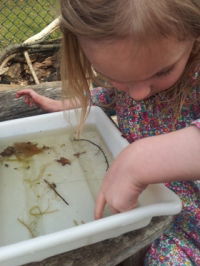Meet the team: Communications Officer
27th August 2015
Here’s the latest in our series of posts where you can meet the Freshwater Habitats Trust team. Meet our Communications Officer:
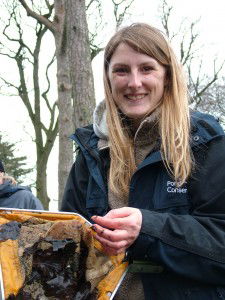 My first incarnation at the Trust, supporting volunteers to take a active role in protecting pond wildlife
My first incarnation at the Trust, supporting volunteers to take a active role in protecting pond wildlife
Tell me your name…
Becca Williamson
And your job title?
Communications Officer
What does that involve?
It means I take the lead in how we tell our story.
I look after the tools we use to tell that story: our website and blog, our social media accounts, our monthly newsletter, and any press releases or news items we want to share. I also answer some of the enquiries we get, and look after the EPCN website. There’s a lot of planning involved, driven by the many projects we run, to make sure we talk about relevant topics, share information, put together effective campaigns, raise awareness and understanding of our freshwater habitats and the threats they face. I use my ecological knowledge to communicate sometimes complex issues to various different audiences. It helps that my background is in ecology and I have worked for the Trust for 8 years as a project officer; I have a deeper understanding of our work and of freshwater ecology than if I had come from a communications background or another field.
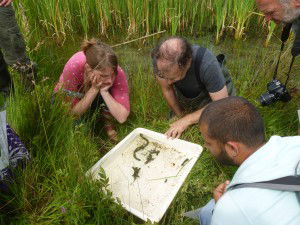 Taking a look at the life that abounds at Pinkhill, our model for the creation of new clean water ponds.
Taking a look at the life that abounds at Pinkhill, our model for the creation of new clean water ponds.
What’s so important about that?
We are always running many different projects, each of them important, all of them moving us towards making our vision, of a thriving, vibrant freshwater network across the country, a reality. Communications is key part of every one of those projects. We need to communicate the importance of protecting the very best freshwater habitats like Flagship Ponds and Important Freshwater Areas. We need to convince people of the need to build new clean water habitats and give them guidance on how to do that, like the Million Ponds Project and the Pond Creation Toolkit. We need to show people the evidence of the state of our freshwaters, what works and what doesn’t, and make sure everyone is putting their effort in the right places. Like PondNet, and our Water Friendly Farming project which gathers evidence of which practices actually protect freshwater wildlife from agricultural pollution and which are just a waste of money.
We have to share that information with others, otherwise nothing will change. We’ll keep using the same old damaging practices on farmland, we’ll carry on with policies that miss the point, we’ll miss fantastic opportunities to reverse the damage we’ve done. Communications moves us from knowledge toward action.
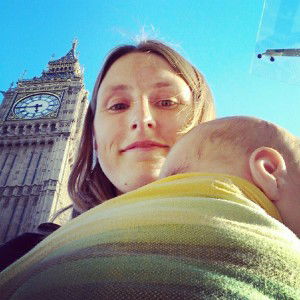 Taking the Million Ponds Project to the House of Lords, with baby in tow.
Taking the Million Ponds Project to the House of Lords, with baby in tow.
What is your favourite part of your job?
I love sharing knowledge and ideas. I love finding ways to help people understand sometimes complex issues, and maybe even feel emboldened or empowered to do something for freshwater wildlife. I like writing, and making things look pleasing – because it helps a lot. I feel a real sense of achievement when I hit the ‘publish’ button on the newsletter. I like answering questions, and feeling like I am making a difference. And most of all, I love being part of an organisation that I feel proud of, and have looked up to my whole career.
And least favourite?
Nothing is instant. Change takes a long time. We want to change attitudes and policies. We have to do the science, gather the evidence. Tell people about it over, and over again. It takes a bloomin’ long time. I feel frustrated. We’re already too late for many sites and species.
I am also not a fan of answering the phone.
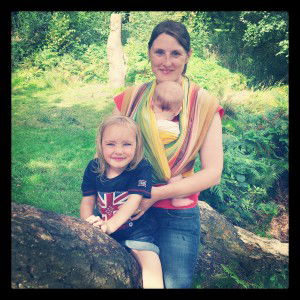 Being a role model and giving them chances to build a connection with nature.
Being a role model and giving them chances to build a connection with nature.
Why do you do it? What do you get out of it, and what keeps you going through the hard days?
I get a feeling of satisfaction. I am doing something, taking on issues, making a difference – small but real. I feel valued by my colleagues. I get to talk, or usually write, about things I love. I have brilliant colleagues who are supportive and appreciative. And I can be a role model for my kids, showing them how to stand up for things that are important, to stand against things they feel are wrong.
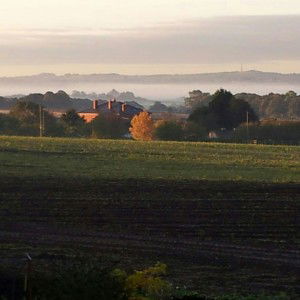 The view from my office window, over the Weaver Valley, Cheshire, where I often contemplate the impact of our lives on nature
The view from my office window, over the Weaver Valley, Cheshire, where I often contemplate the impact of our lives on nature
What does freshwater wildlife mean to you?
It is mostly a jumble of unpronounceable scientific names and tiny brown wiggly things, a lot of it is vulnerable and delicate, and some of it is common (prevalent, banal, cliche, vulgar, thugish, pollution-tolerant) but put it all together and it is an intricate web of life, a microcosm that is both intimate and accessible, and mysterious and intangible.
What’s your favourite freshwater habitat?
It’s always been ponds. Streams can gurgle sweetly all they like, but I’ll always wander back to the self-contained little world of a pond. It might be because it is discrete, has well-defined boundaries; there isn’t an upstream or a distant shore where others can wreak havoc, or a downstream where someone might grumble. I find ponds so aesthetically pleasing, and a peaceful place to just sit and watch. A twinkle of later afternoon sun, a buzz of a dragonfly, an intricate pattern of tiny leaves, a glimpse of a newt…
What got you interested in freshwater habitats?
I wrote about how my dad raised a pond lover last year. He is fascinated by watery places, and shared his curiosity and adventure with me. When I finished my studies and found work, I soon, accidentally, specialised in amphibians. From there it was a natural step to understand more about ponds, and then other freshwater habitats. And here I am, working with the only charity focusing on freshwater habitats in the UK. ‘Twas mean to be.

